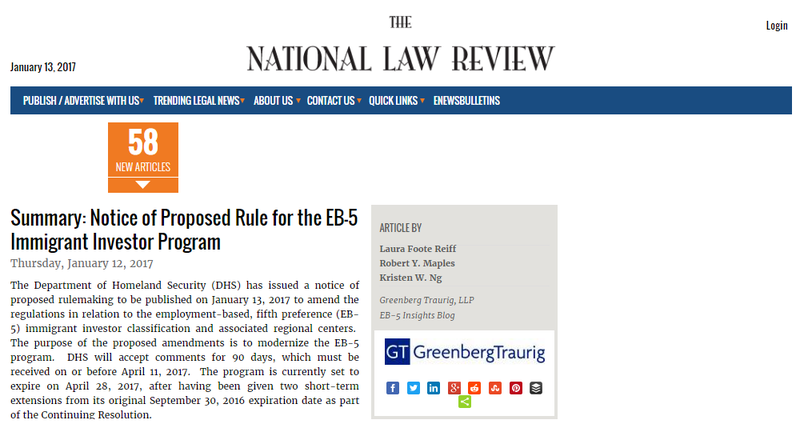Summary: Notice of Proposed Rule for the EB-5 Immigrant Investor Program
The Department of Homeland Security (DHS) has issued a notice of proposed rulemaking to be published on January 13, 2017 to amend the regulations in relation to the employment-based, fifth preference (EB-5) immigrant investor classification and associated regional centers. The purpose of the proposed amendments is to modernize the EB-5 program. DHS will accept comments for 90 days, which must be received on or before April 11, 2017. The program is currently set to expire on April 28, 2017, after having been given two short-term extensions from its original September 30, 2016 expiration date as part of the Continuing Resolution.
The notice of proposed rulemaking (NPRM) proposes a number of amendments that would greatly change the EB-5 program. A summary of the major provisions are provided below:
Increases to the Investment Amounts – Increasing the Minimum Investment Amount
- Increasing the Minimum Investment Amount for High Employment Areas from $1 million to $1.8 million
- Increasing the Minimum Investment Amount for TEAs from $500,000 to $1.3million
- Adjust the Minimum Investment Amounts every 5 years
- No mention of grandfathering or transition periods
TEA Designation
- Allows any city or town with high unemployment (150% of the national average) with a population of more than 20,000 to qualify as a TEA
- Specific Counties within MSAs
- Defines a TEA as a Census Tract (CT) or contiguous CTs in which the New Commercial Enterprise (NCE) is located if there is high unemployment
- Also defines a TEA as a CT where the NCE is located and all other CTs spooled around the NCE CT if there is a weighted average of the unemployment at least 150% of the national average.
- Rural areas qualify as TEAs, but would be redefined to include areas within the outer boundaries of any city or town having a population of 20k or more if in an MSA
- Eliminated the ability of states to designate areas at high-unemployment. This would all be done at the federal level
- No mention of grandfathering or transition periods
- Priority Date Retention – This would allow EB-5 Investors to retain their place in the priority date line, if through no fault of their own, their petition is denied e.g. the RC is terminated, or if business conditions change that would result in an underperforming or failing investment project
Other Technical Changes
- Derivate family members must file their own petitions to remove conditions from their permanent residence in cases where they are not included in a petition to remove conditions filed by the principal investor (except in limited circumstances)
- Allows for flexibility of interview location at the I-829 stage
- Process for issuing permanent resident cards updated to conform to other procedures, i.e. the immigrant investor and derivatives will not need to report to a district office for processing of their permanent resident cards after approval of Form I-829
The NPRM’s stated aim is to reflect statutory changes and to modernize the EB-5 program. Stakeholders are encouraged to review all materials and prepare to comment.
http://www.natlawreview.com/article/summary-notice-proposed-rule-eb-5-immigrant-investor-program
Mentions
States
- Washington
Securities Disclaimer
This website is for informational purposes only and does not constitute an offer or solicitation to sell shares or securities. Any such offer or solicitation will be made only by means of an investment's confidential Offering Memorandum and in accordance with the terms of all applicable securities and other laws. This website does not constitute or form part of, and should not be construed as, any offer for sale or subscription of, or any invitation to offer to buy or subscribe for, any securities, nor should it or any part of it form the basis of, or be relied on in any connection with, any contract or commitment whatsoever. EB5Projects.com LLC and its affiliates expressly disclaim any and all responsibility for any direct or consequential loss or damage of any kind whatsoever arising directly or indirectly from: (i) reliance on any information contained in the website, (ii) any error, omission or inaccuracy in any such information or (iii) any action resulting therefrom.




